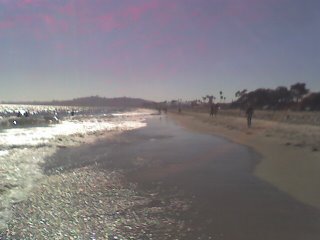Vacation, Conferences, Work
I haven't been to work in almost three weeks. And I really don't miss it. The first two weeks were vacation, and somehow, I managed to pack a lot in. I spent some time at home, a day in Philadelphia, a weekend in New Jersey for a friend's bachelor party, a day in New York, and a few days in Martha's Vineyard. I then proceeded to fly to the west coast for a conference in Santa Barbara, where I am now. So, this is week three, and conference week, but in Santa Barbara, it's pretty hard for anything to really feel like work. The conference is at UCSB, which is on the freaking beach. I really don't know how anyone gets any work done here - it's gorgeous. I know if I was a student here or a faculty member, I would definitely have more of a tan.
The conference is interesting, as I am only peripherally involved in the main field that is the focus of the meeting. I submitted an abstract on a whim because it seemed like an interesting conference in an interesting place, and I was a little surprised when my paper was accepted. I have found a lot of the talks extremely interesting, as they are not really in my direct field of knowledge or expertise. I listened to one talk yesterday where a researcher was discussing the difficulty that the human brain has in healing after trauma - human axons typically do not re-grow through scar tissue, so traumatic brain injury often leads to significant impairment. He and his group developed a technique by which they could induce the brain to heal in such a way as to prevent scarring, and allow axonal re-growth through the area of injury. They demonstrated this by damaging the part of the brain responsible for vision in hamsters, rendering the hamsters blind. The hamsters didn't respond to any visual stimuli after the injury. The control group was allowed to heal without intervention, and they showed no improvement in vision with time. The experimental group received the treatment and over a period of several weeks regained vision up to about 70% of their original acuity as the brain essentially re-grew their optic nerve. To someone without a bioscience background, this borders on "Star Trek-ian" to me.
After the evening reception, I was invited out to dinner with some other young faculty. What followed was a fun evening of discussion and talk about work and research, but I have to admit I felt somewhat out of my element as all of these folks were from significantly higher-tier institutions than me. Like, the top universities in the world.
All in all it has been a really good conference so far - I have done the most networking and talking that I have done at a conference, and while my level of discomfort is fairly high, I am also learning a lot, and hopefully will come home with some new ideas and new potential collaborators.
Some photos:
The National Constitution Museum, Philadelphia, PA:

The conference is interesting, as I am only peripherally involved in the main field that is the focus of the meeting. I submitted an abstract on a whim because it seemed like an interesting conference in an interesting place, and I was a little surprised when my paper was accepted. I have found a lot of the talks extremely interesting, as they are not really in my direct field of knowledge or expertise. I listened to one talk yesterday where a researcher was discussing the difficulty that the human brain has in healing after trauma - human axons typically do not re-grow through scar tissue, so traumatic brain injury often leads to significant impairment. He and his group developed a technique by which they could induce the brain to heal in such a way as to prevent scarring, and allow axonal re-growth through the area of injury. They demonstrated this by damaging the part of the brain responsible for vision in hamsters, rendering the hamsters blind. The hamsters didn't respond to any visual stimuli after the injury. The control group was allowed to heal without intervention, and they showed no improvement in vision with time. The experimental group received the treatment and over a period of several weeks regained vision up to about 70% of their original acuity as the brain essentially re-grew their optic nerve. To someone without a bioscience background, this borders on "Star Trek-ian" to me.
After the evening reception, I was invited out to dinner with some other young faculty. What followed was a fun evening of discussion and talk about work and research, but I have to admit I felt somewhat out of my element as all of these folks were from significantly higher-tier institutions than me. Like, the top universities in the world.
All in all it has been a really good conference so far - I have done the most networking and talking that I have done at a conference, and while my level of discomfort is fairly high, I am also learning a lot, and hopefully will come home with some new ideas and new potential collaborators.
Some photos:
The National Constitution Museum, Philadelphia, PA:

Looking up through the Glass Apple Cube, 5th Avenue, New York:
Aquinnah Lighthouse, Martha's Vineyard, MA:


0 Comments:
Post a Comment
<< Home